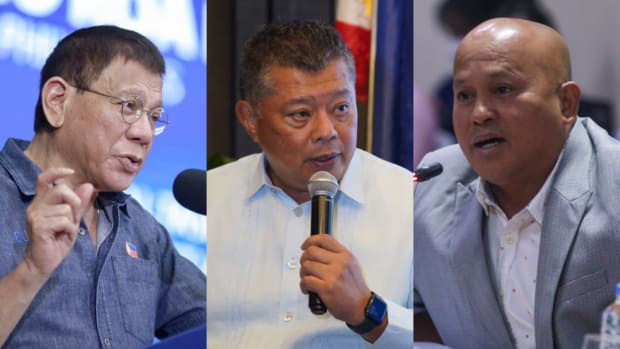
Inquirer.net – Justice Secretary Jesus Crispin Remulla on Wednesday advised former President Rodrigo Duterte and Sen. Ronald “Bato” dela Rosa to avoid going to countries where the International Criminal Court (ICC) could exert its influence, following its July 18 ruling authorizing an investigation into Duterte’s brutal war on drugs.
“Don’t go to countries where the ICC could intervene.
Here in our country, they cannot really meddle,” Remulla told a press briefing when asked if the government would protect Dela Rosa once a warrant was issued against him.
Remulla said he would extend the same advice to Duterte.
“They are citizens of the Republic who also need our protection, so we have to tell them, advise them properly,” he said, adding that he would warn them against traveling to European countries.
“I can talk to them before they visit countries they are unsure of, or where they feel they could encounter problems,” the justice chief said.
Dela Rosa, a former chief of the Philippine National Police, was the architect of “Oplan Tokhang,” the former President’s bloody antidrug campaign that led to the death of thousands of mostly poor drug suspects and prompted the filing of a case in the ICC for alleged crimes against humanity.
On Tuesday, the ICC’s Appeals Chamber voted 3-2 to reject the Philippine government’s appeal to stop the ICC prosecutor’s investigation into the bloody drug campaign during the Duterte presidency.
The ruling, delivered in open court in The Hague, Netherlands, affirmed an earlier decision in January by the Pre-Trial Chamber to allow an inquiry on the basis of the Philippine government’s lack of willingness to investigate or prosecute drug war-related crimes.
The government had appealed that decision and questioned the ICC’s jurisdiction after the country in 2018 withdrew from the Rome Statute—the 2002 treaty establishing the permanent international court, whose purpose is to investigate and prosecute war crimes, crimes against humanity and genocide.
According to the ICC website, 123 countries are parties to the Rome Statute: 33 from Africa, 19 from Asia-Pacific, 18 from Eastern Europe, 28 from Latin American and Caribbean, and 25 from Western European and other states.
Since the Rome Statute came into force, some 40 countries have never signed the treaty, including China, Ethiopia, India, Indonesia, Iraq, North Korea, Saudi Arabia and Turkiye.
Several dozen others signed the statute but never ratified it, among them Egypt, Iran, Israel, Russia, Sudan, Syria and the United States.
In 2017, Burundi became the first country to withdraw from the treaty, followed by the Philippines a year later.
Asked to comment on the ICC ruling, Remulla said he was disappointed but not surprised.
“It’s a sign that tells us that we are on the right track in our opinion on the sovereignty of the Philippines.
We will not allow ourselves to be conquered by people who want to interfere with our own established justice system,” he said, noting the narrow vote.
Working justice system
Remulla reiterated his view that the government should no longer engage with the ICC.
“We will no talk with them.
We don’t need them here.
We do not want them to come here, and they should not come here because what they will do is usurpation of authority of the Philippine government.
We will have problems if they attempt to do that,” he said.
Remulla said the ICC was only needed in countries with no government or a working justice system, citing Somalia, Haiti and Afghanistan as examples.
“We have an organized government with a justice system. We are doing everything we can for justice to prevail in the country,” he said.
On Wednesday, the Senate leadership vowed to stand behind Dela Rosa should the ICC order his arrest.
“Will (we) give him up when the ICC comes out with a warrant of arrest? No, because we have local courts,” Senate President Juan Miguel Zubiri said in a television interview.
“Without a warrant of arrest issued by the [local] court, then as far as I’m concerned, he is still a working member of the Senate [who is] accorded respect,” he said.
The Senate leader, however, said the chamber would not interfere if Dela Rosa would be indicted by Philippine courts for his role in the drug war.
Zubiri cited the situation of former Senators Antonio Trillanes IV and Leila de Lima, both staunch critics of Duterte, who were ordered arrested for separate criminal cases.
Sen. Sherwin Gatchalian agreed, reiterating that the Philippines should not let foreign entities dictate on the country’s justice system.
Country or politics
But opposition Sen. Risa Hontiveros said the President should be careful in handling the matter, since the “people are watching if he will put the country or his political alliance first.”
“My hope is that the President and the agencies of the executive will cooperate with the investigation of the ICC so that true justice is obtained,” Hontiveros added.
The Philippine National Police said it would take its cue from the national government.
“We will follow the instructions of the national government. If [refusing to cooperate with the ICC] is the stand of the national government, [then] we will fully support it,” PNP spokesperson Col. Jean Fajardo said at a briefing.
“As to the extent and nature of the cooperation the PNP would extend to the ICC, we will take heed [of] what the national government will say,” she added.
The PNP would also not submit any of the documents and case folders pertaining to the antidrug police operations and drug-related deaths being kept by its Directorate for Investigation and Detective Management.
The ICC, or any foreign entity, should first “pass through proper channels” before these could be released and be used for investigation, the official said, adding: “But… the PNP is ready to provide when directed [by the national government] to submit them.”
Based on figures released by the national government, a total of 6,252 persons were killed in legitimate drug operations during Duterte’s term from July 1, 2016, to May 31, 2022.
But rights groups believe the actual death toll could be as high as 30,000, including those killed by unidentified assailants and vigilantes.
CLICK HERE TO JOIN OUR WHATSAPP GROUP
CLICK HERE TO JOIN OUR WHATSAPP GROUP
CLICK HERE TO JOIN OUR WHATSAPP GROUP
CLICK HERE TO JOIN OUR WHATSAPP GROUP
Advertise with the mоѕt vіѕіtеd nеwѕ ѕіtе іn Antigua!
We offer fully customizable and flexible digital marketing packages.
Contact us at [email protected]
















